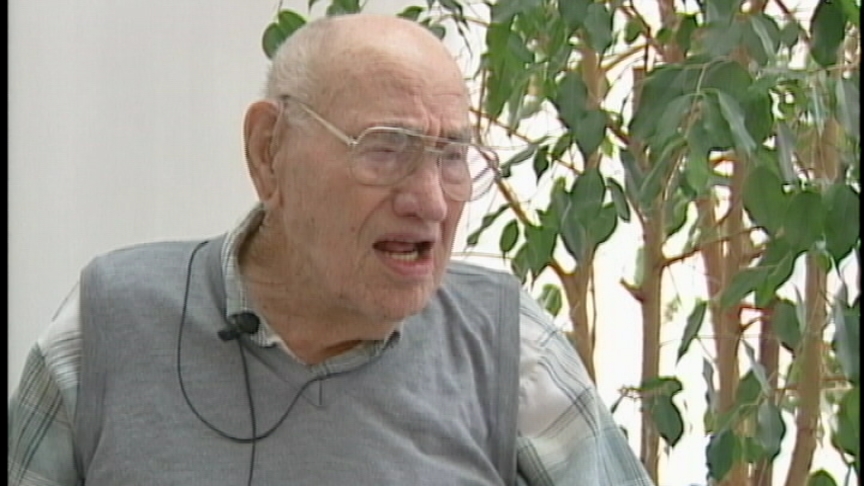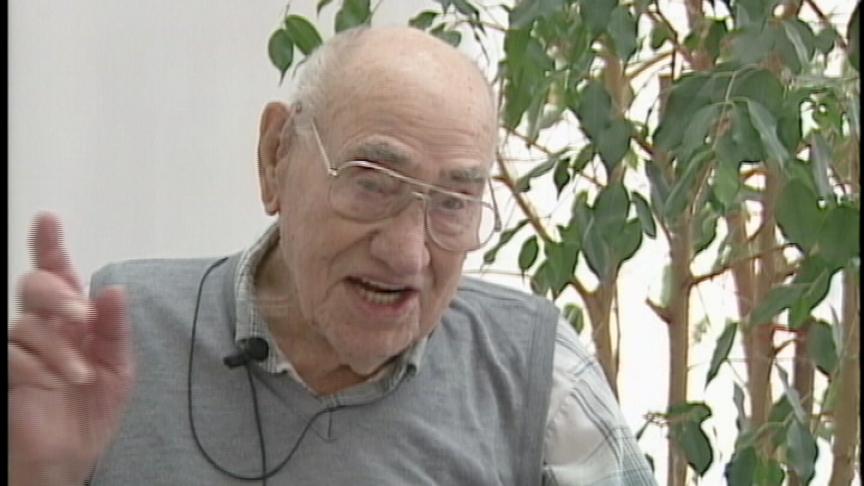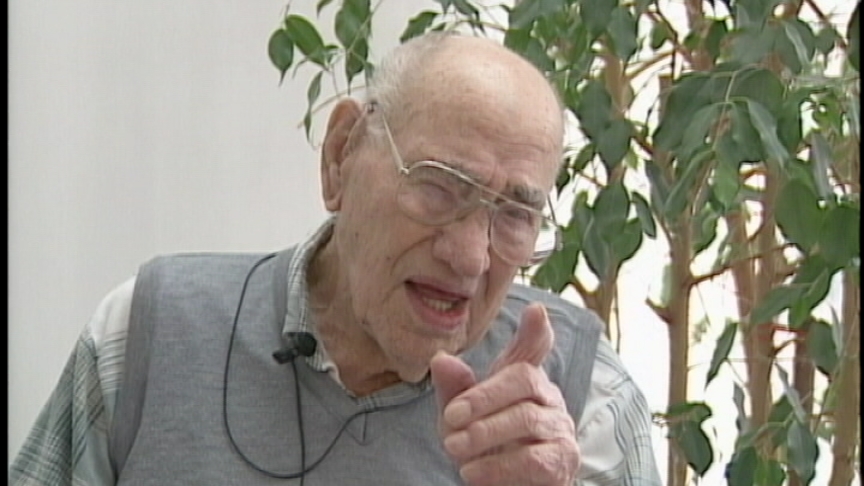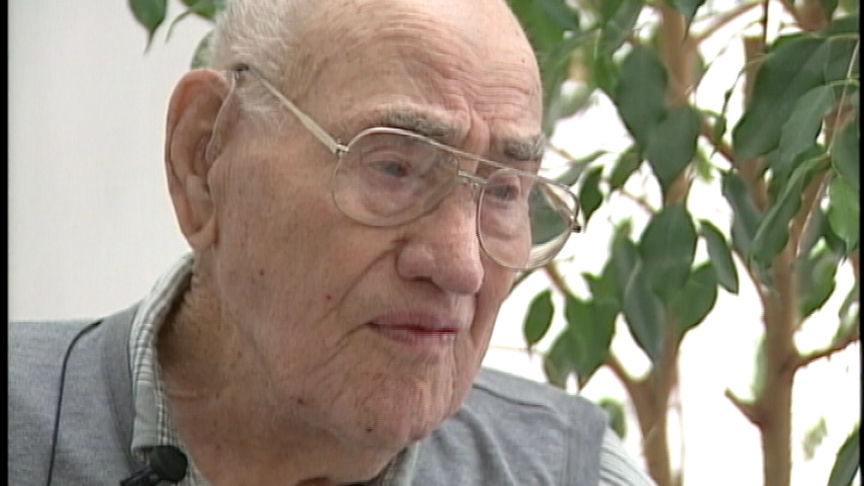There was no preparation for this deal.
The first thing we got word was to give up the line.
They needed us, and we had to go in with reinforcements,
you see, and when I went in there I was wounded.
Interviewer: At the Somme?
At the Somme. Yeah. I was hit in the leg, in the side of the leg
with a piece of shrapnel. It was... the CMRs, the 4 CMRs
was in there and there was one of them captured and they...
We were out on rest at the time, and they forced us in there.
Took us in there, and this place here there was
a big woods there, called Sanctuary Woods.
Yeah that's where I was wounded, Sanctuary Woods.
Interviewer: Did you, was it the wound sufficient enough
to have you taken out of there?
Yes, I was able to get out on my own. The officer said, "You
better get out and take that fellow with you." This fellow that
was with me was shell shocked. He was a man that was
pretty hard to handle so I got him out of the trench, trench
going all the way out you know, a communication trench,
and he was going here and there all the way along.
Sometimes a shell would land behind us, sometimes it would
land ahead of us, you see. We were ducking and dodging,
and it wasn't fun. And this fellow would holler on, my God,
just like a crazy person, you know.
Interviewer: So your wound?
He wasn't wounded, he was shell shocked. I was wounded
in the right leg, I was getting stiffer all the time.
It was ruining the muscle, you see, and I pulled out the junk
out of the leg and it was a piece of, I have it yet home,
it was a piece of shell about that long, like the copper band of
a shell, drove in there, in the muscle of the leg.
The officer give me a, the doctor give me a bawling out over it.
Interviewer: How long were you away from your unit Alf?
Three months, three months and one day. I'll tell you why
the one day. I was wounded on the fourth of January, on the,
on the fourth of June I should say, and I arrived back on the
fifth of September back to fighting again the fifth of September
went down on the Somme.
Interviewer: So the winter of that year,
was your first winter in France?
Yeah, Yeah.
Interviewer: What were the conditions like?
The conditions wasn't very good. I tell you about the conditions.
We, we come out of the Somme, fighting down the Somme.
One of the worst places in all of the war, to my opinion
and we went down and to another place, just holding the line,
you know, just there to keep the Germans back. We left there,
the Somme, in the fall and we had about six or seven men to the
tune which we should have had fifty. We were cut up that bad,
you see, lost all those men down there in the Somme and they
put us there to get reinforcements, to reinforce us up, you see,
and it took the 70th Battalion, and most of them to reinforce us
you see. And then after that we got ready for the Vimy Ridge,
you see. All winter we were holding the line there, that winter
and the conditions were bad and we were right in line with an
old barn. There was bunks there made out of chicken wire,
you know, and cold, no heat, no heat. And the two fellows
would bunk together with all your clothes on, and two blankets.
You had a blanket each to pull over you, roll yourself up in
and it was pretty cold.
Interviewer: That was when you were out of the trench?
Yeah, out of the trenches.
Interviewer: What was the routine Alf? How many,
how much time would you spend in the tenches?
You spent all of... trenches. When you went in, you were in
there for a week unless you were wounded and they took you out.
Maybe two weeks before you got reinforcement to, to come in
and take you out, you see, to relieve you and to give you a rest.
And you were in dugouts there and every day you're looking over
the parapet or watching the Germans coming, if they're coming,
you're shooting at them or they're shooting at you and that's the
way it is, and at night time you put on censors and some fellows
fell asleep. Go down to the dugout and have a sleep for a while
and then get them out and the other fellows have a chance
to have a sleep. Then, besides that they'll come to you and me
and him and so on, I want you to go out to No Man's
Land tonight. You've got to come with me. We're going to patrol.
So you walk, you don't walk, you crawl around all between the
two front lines. You're looking for Germans, they're doing
the same, you understand. You come across them and
you're into a battle, you see, with bombs and things like that
you see. So it's not very quiet, no it's not a quiet sleep.
Interviewer: So you're in the front line, the trench.
The front line, you're in there for six,
from two weeks to three weeks.
Interviewer: Then you are taken out for how long?
You are taken out for a week, maybe, maybe if you're lucky you
might get two weeks out of it. You'd be taken off of that and
maybe go on another front, you see, after you're out the week and
then go on another front, relieve somebody else
on another part of the front, and that's the way it is.
Interviewer: So when you're out of the line, you're back in
these billets that you just talked about, are you?
When you're out, when you're out of the line, you'll have
a little rest for about a day and then you're in this drill and
all that sort of stuff, road marching and stuff like that to
keep you in shape. When you are out of the line there for
a while, you practice it, for the Vimy racket, you know.
So when the time comes we all got in. You have to go to the
trenches and get into our trenches, you're facing the Germans
but you're quite a ways away. At 5 o'clock in the morning
that was zero. When five o'clock come the artillery opened up
and we went. They opened up and we opened up, you see,
and we lost quite a few men and all that sort of thing,
but not like, not like down in the Somme.
Interviewer: What do you remember about the Vimy Ridge?
Do you remember the weather?
The weather, well yes. I remember the weather, quite well
the weather. It was snowing and raining that morning, just like
a fine rain but snow with it, and we were... The Germans figured
they won't go today, they had an idea but that's the day we went.
It didn't stop us from going, but before the day was over it was
just as nice of a day as this, and it cleared up and it was all
right and it cleared up before we got to, up to the top
of the ridge.
Interviewer: Do you remember what your objective was of your unit
Well our... just one part of the ridge, one part of Vimy Ridge.
our outfit was lined up for one part of the ridge. There was
nothing there but trenches was there, and the ridge and back
of the ridge was a gold mine, was a coal mine so if you went over
the ridge, you fall over the edge of it you see. There was a coal
mine there and, and a little village on the other side of it.
I had never seen it till I took to the ridge, I never knew it
was there. Of course, some of them knew about it by the second
air plane photographs and things like that, but as far as we were
concerned we didn't know that little village was there.
You see, it was just over there, there was a mine right there.
Interviewer: As you were going up the ridge,
and as you got to the top, was there a lot of Germans
still on the ridge holding it?
No. No, we didn't take too many prisoners, they took off.
They took off. They, they got, we got a lot of them, but not,
not like we should have got. They took off over the ridge and
crossed over that ridge then you could shoot them going over it.
It's just like, it's just like a big farm on the other side and
that's where we was, farming country. A big farm the other side
of the ridge and until you come to Avion and Méricourt for
about a mile, you see. And that was all farm land.
The Germans was in the open there you see.
Interviewer: So they moved back to Méricourt.
They moved back. The Germans moved back to Méricourt?
Oh yeah, they, they went right back there you see.
That was their hold, hold that was their line to hold, you see.
And Vimy, we held Vimy there, stayed on Vimy there for
all summer, all that summer practically, 'cause our outfit,
it was around that, around that place all summer till the fall
of the year, till we got word to advance.
Interviewer: What did you come back to? What was your
reaction, Alf, when you reached the heights of Vimy Ridge?
What was your reaction?
Oh, it was great to, great to get on top of the ridge and see
what's going on, on the other side. You couldn't stand,
you couldn't stand up out of the trench. You had to look,
you know, you're in the trench, you see. You were in the German
trench then because we had no trenches there. The Germans had
the trenches, so you pulled them out of the trenches and you got
in and that's about the size of it.
Interviewer: Were you aware at the time
how great of a victory it was?
Oh yes sure... It was a great, great victory. After, when
the French, the French, the British, one of them, I think it was
the French lost 18,000 men there trying to take it and couldn't
take it and then the British come in. I don't know how many they
lost, they couldn't take it and we came in and took it, that's
the size of it. They had the, they had the Australians with them,
some of the Australians were British too, with them when they,
they..., so we never stopped. We were held up on the left flank,
the 85th Battalion was held up towards Hill Seventy, over
that way. We had to send, send some troops over, wasn't me
because I was on the right flank. I was connected up with the...
Our division, our platoon was connected up with a battalion from
New Brunswick, and it was the Second Division, you see.
So they tried to send some of the boys from that end, the other
end, down to help them out.
Interviewer: Would that have been the 26th Battalion?
The 26th, and all of the 24th, the 24th or the 26th,
one or the other, and I had a cousin in one of them.
He, he was, he was wounded, he was wounded in that battle.






